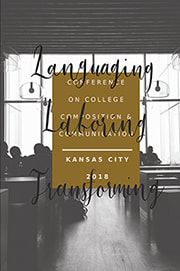I've commented on my experience at ATTW 2018 here and here. CCCC 2018 met immediately afterwards, as I noted, across the river in Kansas City, Kansas. To be fair, I was all conferenced out after ATTW, but had been accepted to present at Cs and was looking forward to many of the scheduled presentations.
I've never been responsible for conference logistics so I have no idea what's involved. I imagine it's a lot. The demand that plans be made years in advance probably only compounds the challenge.
As an early career scholar, I'm still trying to find my place in the world. I have not been certain that Cs is where I "belong" as a researcher or teacher. But I've met good people there, the work is interesting, the diversity of interests generative. So I was looking forward to the experience, but I was uncertain.
Consequently I was late to the opening session (along with others) as I had to hike what felt like a half or 3/4 miles to the auditorium. Program Chair Asao Inoue was in the middle of a moment of silence for those colleagues who were not present for whatever reason when I and a number of us burst in, out of breath, sweating. He later asked us write down a single word describing our current state and that could be used to propel us in to the conference. For me it was "discombobulated."
It actually began with a pre-conference email from Asao asking us to be sure to have texts of our talks and handouts for our sessions to help meet the accessibility needs of our colleagues. This struck me hard and I was stunned that it hadn't ever framed itself that way to me.
Like many grad students I'd always been in a desperate state going in to a conference presentation. I was always That Guy working on the PowerPoint in someone else's session, desperately trying to fit the WHOLE WORLD CHANGING THING in to 15 mins.
I have a BA in Theater Arts. So I hate presenting from a text. I want to get up there and just improv/stand-up routine my way to a compelling presentation. It had never occurred to me this was a problem for colleagues with hearing/seeing impairments. Nevermind colleagues' with "invisible" disabilities, focus and attention issues, that my presentation "style" might not serve.
I realized that failure to provide a text was an accessibility failure on my part. Even before we consider that slamming together the final draft of a scholarly presentation the week of the conference is just unprofessional...
Thinking about what it meant to make a document "accessible" led me to discover the "accessibility checker" function in Word. I began thinking about alt text for my complex images/diagrams. I didn't succeed fully, but suddenly I realized this needed to be part of my process from here on out.
Planners had set up a breakout, workshop-style response to these presentations. Each table had handouts and facilitators at each table to aid our discussion. It was soon clear that the handout was a lengthy document that was supposed to be read before the conference. This was probably shared in an email and then got lost. I was not conscious of seeing it before. We had no facilitator which was a problem probably exacerbated by the fact that we ended up being a table of white-passing, early career scholars who didn't know how to proceed in a programmatic context like this anyway. I left before the report out session. It felt like a missed opportunity.
This was repeated the next day when another set of panelists had not been directly told about their change to the accessibility room. Thankfully we caught it sooner and everyone was present.
That these particular issues both involved early career scholars and graduate students of color either attending or in one case supposed to be presenting, was especially disheartening.
But I take note of these things precisely because they are part of my view "from below."
They are the things I want to remember going forward as I participate in organizations, local and national.
I've already begun to re-think how I design my documents to be accessible to readers, reviewers, students. I have been thinking about the spaces we inhabit, how we think about people different than us in those spaces, how our own use of space is exclusive, erasing, or domineering.
My awareness about the experience of others is being widened. For whatever reasons we are just now collectively beginning to pay attention to the voices of those who have been telling us all these things for years.
I don't know that the answer lies in massive organizations and institutions. They provide the resources certainly for us to be able to afford the space and tools to make those spaces more inclusive. I am certainly grateful for those opportunities.
But we can't technologize our way out of the problems humanity faces. We have to become attune to and listen to the world outside, the bodies and voices we so often ignore.
And let's be honest, by "we" here I mean mostly white, able-bodied, economically stable people. Everybody else knows. Because they're the ones who have been accommodating our ignorance for far too long.
As I said in the last reflection and others have noted, we probably need to rethink conference "culture." There may be better ways to do this, to accomplish what we want from conferences.
But if it's dangerous, we need to do it ever more carefully and thoughtfully.


 RSS Feed
RSS Feed